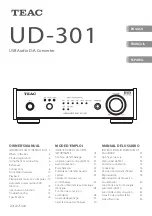
1300 Henley Court
Pullman, WA 99163
509.334.6306
www.digilentinc.com
PmodENC
™ Reference Manual
Revised January 20, 2016
This manual applies to the PmodENC rev. A
DOC#: 502-117
Copyright Digilent, Inc. All rights reserved.
Other product and company names mentioned may be trademarks of their respective owners.
Page
1
of
3
Overview
The Digilent
PmodENC
features a rotary shaft encoder with an integral push-button to provide multiple types of
outputs. The module also includes a sliding switch that is commonly used as an on/off output. An encoder is
commonly used in freely rotating volume knobs to detect how many “clicks” a knob has been rotated.
1
Functional Description
The PmodENC utilizes a rotary shaft encoder as a way for users to quickly switch between multiple options such as
choices shown on a screen or predefined motors speeds. An integral push-button on the shaft as well as a slide
switch allow for a highly configurable Pmod.
2
Interfacing with the Pmod
The PmodENC communicates with the host board via the
GPIO protocol. It provides four inputs to the system
board; the two buttons internal to the encoder that are in quadrature with each other as well as the integral push
button on the shaft and the slide switch. A system board will read the integral push button and the slide switch at
a logic low voltage in their native (or off in the case of the switch) states.
The PmodENC.
Rotary push-button shaft encoder
Add multiple types of user input to host
board or project
Additional static slide switch
Small PCB size for flexible designs 1.5 in ×
0.8 in (3.8 cm × 2.0 cm)
6-pin Pmod connector with GPIO interface
Follows Digilent Pmod Interface
Specification Type 1
Library and example code available
in
Features include:





















